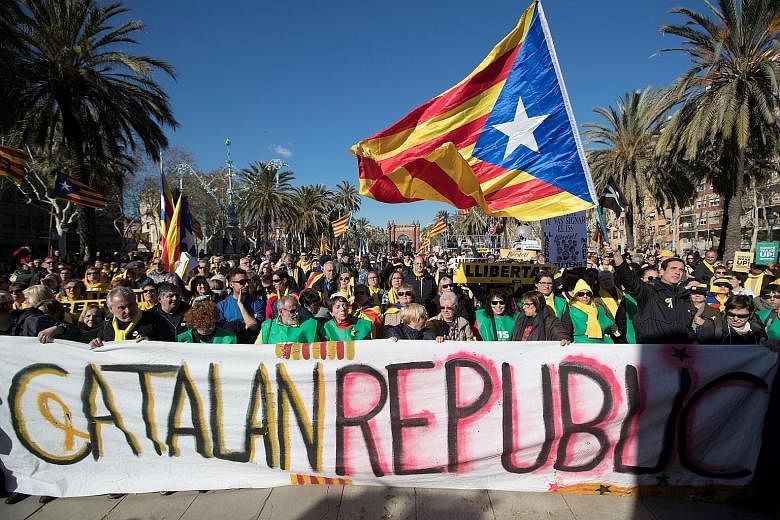Separatists in Spain have regained control of the regional Parliament in the restless province of Catalonia just a few months after it was dissolved by order of Spain's courts and national government.
The move again raises the spectre of a prolonged constitutional fight over Spain's territorial integrity. But there are also indications that a new generation of Catalan nationalists may be anxious to avoid further constitutional showdowns by adopting a more moderate stance in their disputes with Spain's central government.
With its distinct language and history, Catalonia has enjoyed a large measure of autonomy for almost half a century, and the continuation of this status is not challenged by any Spanish politician. The dispute is instead over the intention of a motley collection of nationalist and far-left parties to obtain full independence, even if this means resorting to extra-legal means.
Last year, they held a referendum on Catalonia's independence, despite the fact that Spain's highest courts declared the vote null and void. Turnout was just 42 per cent and the exercise lacked any safeguards of fair ballot counting. Nevertheless, Mr Carles Puigdemont, the then-President of the regional Catalan government, claimed that the Catalans "won the right to be an independent country" and used the referendum as a justification to declare independence unilaterally.
The central government in Madrid responded by dissolving the Catalan government and ordering new elections. Most of Catalonia's top officials have since been charged with sedition and abuse of office, although Mr Puigdemont and his closest associates fled to Belgium, where they are fighting a Spanish extradition warrant.
New elections were held in Catalonia last month, and the chief winner was the Citizens' Party, a centrist movement strongly opposed to separatism.
However, given the province's electoral system, the Citizens' Party secured only a quarter of the seats in Parliament, with a collection of separatist movements still being able to form a majority. The expectation was, therefore, that the confrontation between the government in Madrid and the separatists would resume. But as the newly elected Catalan Parliament met for the first time this week, there are signs that the nationalists are pulling back from the brink. They initially intended to allow Mr Puigdemont and four other fugitives from Spanish justice who have been re-elected to vote "through representatives" in the new legislature. But when Spain's central government threatened court proceedings to rule this illegal, the Catalan separatists accepted that those not present would not be able to vote.
More significantly, the nationalists pushed through on Wednesday the election of Mr Roger Torrent, a 38-year-old moderate, as the new parliamentary speaker. Mr Torrent immediately struck a conciliatory tone, seeking to reassure those who oppose Catalan secession that the majority which the pro-independence parties enjoy would not be abused. "Absolute majority is not absolute truth," he said, quoting the words of a famous Spanish academic. "Majorities have to be taken for what they are: a stimulus that spurs us to work and not a blank cheque for the government."
All eyes are now on the political machinations to create a new government. Mr Puigdemont wants to return to power as the head of the new Catalan Cabinet, notwithstanding the fact that he is in Brussels. His idea is that he could run Cabinet sessions through online Internet chat and messaging services such as Skype which, supposedly, would make him just as accountable to Parliament and officials as if he were physically in Barcelona, Catalonia's capital.
But Spanish Prime Minister Mariano Rajoy has threatened a swift court challenge should Mr Puigdemont go down this route, arguing that "government by Skype" is "an absurd idea". And most of Catalonia's own nationalists privately agree. While they are loath to see Spain's central government prevail in this confrontation, they also fear that a further dispute over Mr Puigdemont's status will end in another legal defeat and may expose the nationalist movement to ridicule. The decision on a new government will come next week, and the outcome remains unpredictable.
Either way, the new Catalan Parliament, remarked El Pais, one of Spain's most influential newspapers, in an editorial yesterday faces only two choices: "It could either end the abnormal, traumatic situation of the province, or return to the road of illegalities".
And Mr Rajoy seems determined to make no concessions to Catalonia's nationalists.

